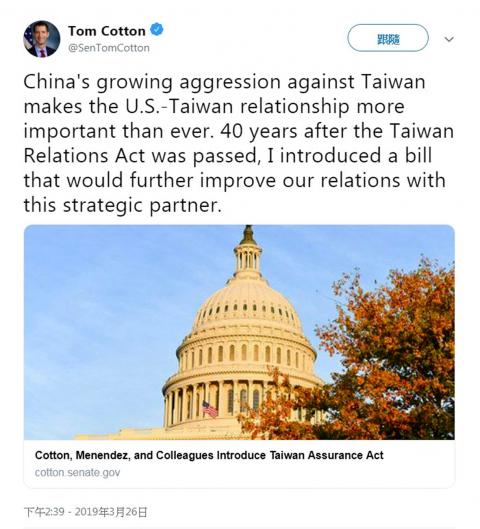A group of US senators across party lines on Tuesday introduced a bill that would cement two-way ties with Taiwan and support its international presence, as the Taiwan Relations Act is next month to mark its 40th anniversary.
US Senator Tom Cotton said in a statement that he has introduced legislation with five other senators that “would enhance the US-Taiwan relationship and bolster Taiwan’s participation in the international community.”
“Taiwan is a vital democratic partner of the US. Forty years after the Taiwan Relations Act was signed into law, our bilateral ties should reflect this reality,” Cotton said.

Screengrab from Tom Cotton’s Twitter feed
Called the Taiwan Assurance Act, the legislation “would deepen bilateral security, economic and cultural relations, while also sending a message that China’s aggressive cross-strait behavior will not be tolerated,” he said.
US Senator Robert Menendez, a bill cosponsor, said that he believes the US Congress needs to make a statement of support for Taiwan 40 years after the Taiwan Relations Act was passed in April 1979.
“It is critical that congress speak with one voice about the importance of maintaining Taiwan’s diplomatic space, deepening our ties with Taipei and assuring the people of Taiwan have a voice in determining their own future,” Menendez said.
Another cosponsor, US Senator Marco Rubio, said that the US must continue to enhance its strategic relationship with Taiwan against an increasingly aggressive China.
“Taiwan is an important democratic partner whose security is critical to advancing America’s national security interests in the Indo-Pacific [region],” he said.
The Taiwan Assurance Act would require the US president to review the US Department of State’s guidelines on relations with Taiwan and direct the US secretary of defense to work to include Taiwan in bilateral and multilateral military training exercises, the statement said.
It would also mandate that a flag or general officer serve as the US defense attache in Taipei and that the US would continue to push for Taiwan’s meaningful participation in international organizations.
The bill expresses congressional support for Taiwan’s asymmetric defense strategy, regular US arms sales to Taiwan and the resumption of bilateral trade talks between the US and Taiwan.
To become law, the measure needs to pass the Senate and the House of Representatives, and be signed into law by US President Donald Trump.
Its passage would likely rankle Beijing as the US and China are edging toward a possible deal to ease a months-long tariff dispute.
US Representative Michael McCaul said he plans to introduce companion legislation in the House.
Additional reporting by Reuters

The US government has signed defense cooperation agreements with Japan and the Philippines to boost the deterrence capabilities of countries in the first island chain, a report by the National Security Bureau (NSB) showed. The main countries on the first island chain include the two nations and Taiwan. The bureau is to present the report at a meeting of the legislature’s Foreign Affairs and National Defense Committee tomorrow. The US military has deployed Typhon missile systems to Japan’s Yamaguchi Prefecture and Zambales province in the Philippines during their joint military exercises. It has also installed NMESIS anti-ship systems in Japan’s Okinawa

‘WIN-WIN’: The Philippines, and central and eastern European countries are important potential drone cooperation partners, Minister of Foreign Affairs Lin Chia-lung said Minister of Foreign Affairs Lin Chia-lung (林佳龍) in an interview published yesterday confirmed that there are joint ventures between Taiwan and Poland in the drone industry. Lin made the remark in an exclusive interview with the Chinese-language Liberty Times (the Taipei Times’ sister paper). The government-backed Taiwan Excellence Drone International Business Opportunities Alliance and the Polish Chamber of Unmanned Systems on Wednesday last week signed a memorandum of understanding in Poland to develop a “non-China” supply chain for drones and work together on key technologies. Asked if Taiwan prioritized Poland among central and eastern European countries in drone collaboration, Lin

BACK TO WORK? Prosecutors said they are considering filing an appeal, while the Hsinchu City Government said it has applied for Ann Kao’s reinstatement as mayor The High Court yesterday found suspended Hsinchu mayor Ann Kao (高虹安) not guilty of embezzling assistant fees, reducing her sentence to six months in prison commutable to a fine from seven years and four months. The verdict acquitted Kao of the corruption charge, but found her guilty of causing a public official to commit document forgery. The High Prosecutors’ Office said it is reviewing the ruling and considering whether to file an appeal. The Taipei District Court in July last year sentenced Kao to seven years and four months in prison, along with a four-year deprivation of civil rights, for contravening the Anti-Corruption

NO CONFIDENCE MOTION? The premier said that being toppled by the legislature for defending the Constitution would be a democratic badge of honor for him Premier Cho Jung-tai (卓榮泰) yesterday announced that the Cabinet would not countersign the amendments to the local revenue-sharing law passed by the Legislative Yuan last month. Cho said the decision not to countersign the amendments to the Act Governing the Allocation of Government Revenues and Expenditures (財政收支劃分法) was made in accordance with the Constitution. “The decision aims to safeguard our Constitution,” he said. The Constitution stipulates the president shall, in accordance with law, promulgate laws and issue mandates with the countersignature of the head of the Executive Yuan, or with the countersignatures of both the head of the Executive Yuan and ministers or